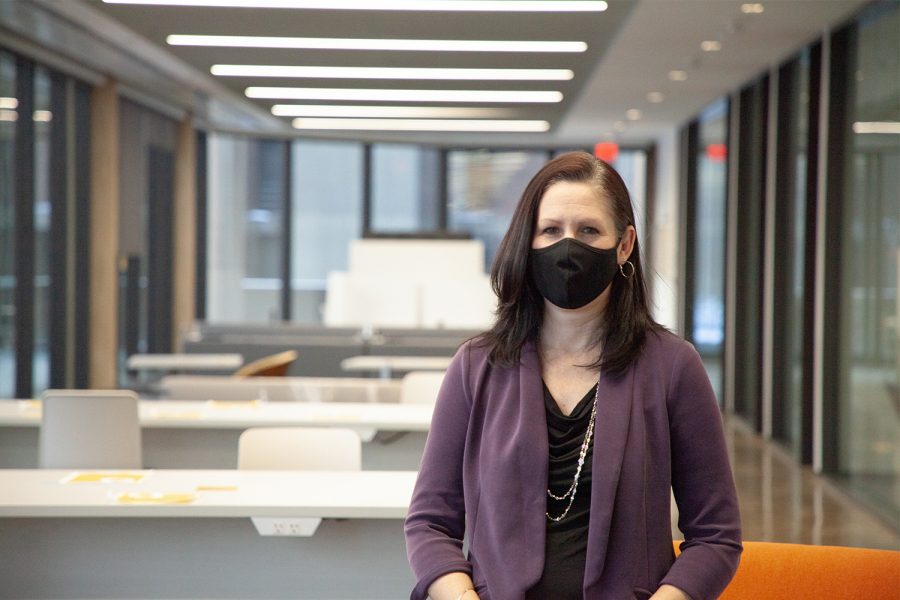UI College of Nursing receives $8 million to educate health care providers in rural Iowa
An $8 million grant from Leona M. and Harry B. Helmsley Charitable Trust will allow the University of Iowa College of Nursing to partner with rural hospitals in Iowa to provide simulation-based education and improve patient outcomes across the state.
University of Iowa’s College of Nursing recently received a $8 million grant. Assistant Professor at the College of Nursing Jacinda Bunch poses for a portrait on February 9 2021.
February 10, 2021
The University of Iowa College of Nursing received an $8 million grant from Leona M. and Harry B. Helmsley Charitable Trust to help rural Iowa health care workers, using simulation-based education, hone their skills and improve patient outcomes.
The Simulation in Motion-Iowa program will allow health care professionals to practice their skills using patient simulators and trucks equipped with medical resources. The three trucks the college will use are designed to look like emergency departments and ambulances, with a space in the back for educators to coach students.
The project, which was started by a team of health care professionals in South Dakota seven years ago, helps rural health care providers avoid obstacles they face when receiving education, Jacinda Bunch, assistant professor of nursing and co-director of the program said.
“Some emergency situations are not seen very often, and it’s hard to keep up on those skills and remember everything you should do,” Bunch said. “If we can bring simulation for some of those critical emergency situations and let the providers practice, it allows them to build some comfort level and to hone those skills in order to provide better care for the people in their community.”
By bringing the simulations to these rural areas, health care providers can avoid travel time and expenses to urban areas to develop these skills, Bunch said. She said many providers in rural areas can go months or years without seeing life-threatening scenarios, which can lead to worse outcomes if they do encounter them.
With the simulation program, UI health care professionals will work with providers in rural parts of the state to educate these providers so they know what to do if they encounter a patient with a life-threatening situation, such as cardiac arrest.
Simulations allow students to retain information better and feel more confident when confronted with a rare but life-threatening health care emergency, Cormac O’Sullivan, clinical associate professor of nursing and co-director of the Simulation in Motion Iowa program, said.
“Health care providers really remember what to do when they do simulations,” O’Sullivan said. “As the students and providers practice, they become more comfortable in the scenario and more open to learning and retaining it better.”
Walter Panzirer, a Helmsley Charitable Trust trustee, said the trust started this program over 10 years ago and have since expanded to eight states — South Dakota, North Dakota, Nebraska, Wyoming, Minnesota, Montana, Nevada, and now Iowa. With over $49 million invested in rural Iowa health care education, Panzirer said they hope this will become a sustainable program that will help patients and health care providers for many years to come.
“We hope to improve quality outcomes, because the more you can train on something, the better the outcomes will be,” Panzirer said. “We’re hoping to see increased positive trends, making it easier for the EMS and hospital-based folks to get their continuing education hours.”
In addition to purchasing three vehicles, the College of Nursing will use the grant money to equip vehicles with health care personnel who can train individuals in these communities. They will also fund lifelike mannequins that can simulate many complications and have similar anatomies to real humans, O’Sullivan said.
Bunch said she expects the trucks to be ready by summer 2022. Before then, the UI will continue to work with over 113 rural hospitals across Iowa to develop scenarios tailored to the needs of their programs.
“Our goal is to build partnerships and work closely with communities to help them develop their programs and to learn from them, as well,” Bunch said. “We want to make simulation education more affordable and easier for these communities to access.”
O’Sullivan said he hopes this program will lead to better health care outcomes for patients across the state of Iowa.
“Our main goal is to make health care better for everyone in the state of Iowa. We hope that every person who touches the patient will feel comfortable addressing some of the top causes of bad outcomes,” O’Sullivan said. “If we can fix those in every county in the state, we can improve care for all patients in the state and all patients will have better outcomes.”



